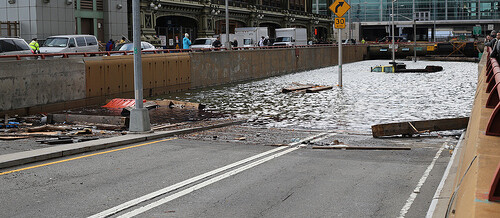
By: Pam Hunter
Source: enr.construction.com
A new White House-sponsored report concludes that climate change already is having an impact throughout the United States, with infrastructure feeling some of the effects, and says urgent action is needed to ensure that catastrophic results don’t materialize.
The third U.S. National Climate Assessment (NCA), which the White House released on May 6, says that rising sea levels, heavy downpours and extreme heat are damaging infrastructure of all types—including roads, rail lines and airport runways. It adds that the costs are expected to climb significantly in coming decades.
The study, developed over four years by climate scientists, technical experts, engineers and others, showed that the average temperature has increased by 1.3 to 1.9 degrees F. since 1895. Most of the increase has occurred since 1970 and the most recent decade was the warmest on record, it adds.
According to the White House, the report’s findings underscore the need for immediate steps to combat the threats.
The report comes at a time when President Obama has focused considerable attention on climate change. In June 2013, he issued a climate action plan and last September, the Environmental Protection Agency issued a proposal that would, for the first time, regulate greenhouse-gas emissions from new powerplants. An EPA rule covering existing powerplants’ air emissions is expected in June.
The climate assessment drew praise from environmental and other groups, with many of them calling for more aggressive action.
Steve Winkelman, director of the Center for Clean Air Policy’s adaptation and transportation programs, says the report will be a useful tool to help federal agencies, states and communities understand how climate change is affecting their day-to-day activities.
He said: “This high-quality information coupled with the administration’s new Climate Data Initiative will help decision makers and the public make informed decisions about development and infrastructure in order to safeguard key assets and services. By enabling all of us to plan ahead, the National Climate Assessment will help avoid business disruptions, power outages and flood damages that are a drag on the U.S. economy.”
Christine McEntee, American Geophysical Union executive director and CEO, said in a statement, “Some communities are already starting to address the impacts of climate change and prepare for the future—but much, much more needs to be done.”
She added, “The type of information the NCA provides is exactly what they need to make critical decisions about things like how much to spend on flood control and how to protect homes and infrastructure. ”
But Sen. David Vitter (R-La.) criticized the study. He said, “The administration’s Climate Assessment suffers from problems similar to those in reports put forward by the [Intergovernmental Panel on Climate Change]; while intended to be a scientific document, it’s more of a political one used to justify more government overreach.”
Vitter added, “Definitive policy decisions and regional planning based on far too many uncertainties could hurt our nation’s economic viability and competitiveness. Look no further than the European nations the Obama administration aims to imitate whose policy decisions led them to economic failure.”
Share